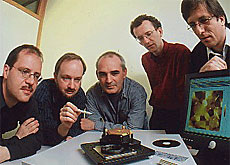The Swiss federation recruits venture capitalists

This week, CTI-Start-up, an effort initiated by the Commission for Technology and Innovation, asked foreign and local venture capitalist to join it in investing in early stage high- tech companies here.
The CTI Start-up program whose primary objective is to help the scientists understand what it takes to be a successful entrepreneur is an outgrowth of the Federation’s innovation policy and a part of the Federal Office for Professional Education and Technology.
The announcement was made at an event hosted by the Swiss Private Equity and Corporate Finance Association (SECA).
Urs Althaus, head of CTI Start-up points out that a number of SECA members, such as Christian Wenger of the law firm Wenger, Vieli, and Belser, Alain Nicod, CEO of Venture Incubator, Markus Oswald of Aventic, and Markus Glauer, head of private equity at the Zürich Cantonal bank, are already active members of the project, but he would like to see some more members of the private equity industry sign on.
Road shows
Althaus says the CTI-Start-up will run four “road shows” a year to be held in Lausanne, Zurich, and Bern, where investors can meet and evaluate projects supported by CTI.
The professionals who get involved with CTI Start-ups, either as investors or coaches, are not altruistic.
Although, they do say things that sound unselfish: “We are laying the economic foundation for our children,” said Alain Nicod that night, for example.
But in general their motivation is much the same as that of the business angel who invests time and money on startup companies with an eye to achieving much better returns than investing at a later stage in the company.
It is also a good chance to improve “deal flow”, say venture industry participants.
For non-finance industry executives, it is a chance to see what kinds of technologies are emerging that might positively or negatively and to find new business partners or customers.
Each project receives funding for research, which is paid to the university. The startup company has to match the government funding franc for franc.
It also pays for coaches.
Coaches help with business plan creation.
Some might eventually invest money in such companies or help the companies to find capital.
CTI Start-up’s funding for research, which is paid to the university not to the startup, does not have to be repaid, nor is it paid for with shares.
“It is a good deal for individuals who invest in these startups.
You’re seed phase company is getting subsidized research and development carried out by PhD at Swiss universities for free,” said Christian Wenger, a SECA board member.
Track record
The effort has resulted in turnover by the young enterprises involved of some SFr 100 million, according to CTI’s statistics.
CTI Start-up alumni firms, such as BridgeCo in Zürich, which makes computer chips for the consumer electronics and PC markets, or digital imaging firm Dartfish, and Nanosurf in Basel, are some who have made significant progress in commercializing cutting edge research in the past few years.
They are all building up key customer relationships and partnerships to sell their innovative products worldwide.
Since 1997 CTI Start-ups project managers have screened more than 650 applications and selected some 64 teams.
These firms that have gone on to create 500 skilled jobs (direct).
These achievements were made with a total budget of SFr 20 million, which paid for the salaries, funding of the research and coaching, and the costs of administering the projects.
Just for comparison, Novartis Venture Fund (spinoff and startup fund), which has been running for a similar length of time has created a similar number of firms.
It also “lost” a similar number of firms.
It has, however, created more than twice the number of jobs, according to the venture fund’s annual report for 2002, but it achieved these results with five times the money.
Another thing about the Novartis fund is that it has had three “exits”, meaning it was able to cash out its investment by selling shares after an initial public offering.
That kind of success makes it the envy of folks like Althaus who says he would like to see more rapid growth among the CTI startups.
“Too many owners of these tech firms see having their own company as a lifestyle, rather than a true entrepreneurial endeavor,” says a venture capital manager on the sidelines of the event.
Some attending the event questioned the need to have the government involved at such a practical level.
The fact is such tactics are widespread in Europe and North America.
Israel’s much talked about entrepreneurial scene is a direct result of fiscal policies and government recruiting of foreign direct investments.
The same is true for Ireland.
In the US, the federally funded “Small Business” initiative does much to promote entrepreneurialism and in Canada the Canadian Advanced Technology Alliance does similar work.
There is a web page set up by CTI Start-up for investors who want to attend the road shows. ( http://www.ctistartup.ch/file/Antragsformular_CTI_Investors_Association.doc )
Jane Royston, another participant at the event, announced that the CTI is also helping to roll out a Swiss-wide implementation of her successful courses in entrepreneurship, which have been running at Swiss Federal Institute of Technology in Lausanne.
Valerie Thompson

In compliance with the JTI standards
More: SWI swissinfo.ch certified by the Journalism Trust Initiative








You can find an overview of ongoing debates with our journalists here . Please join us!
If you want to start a conversation about a topic raised in this article or want to report factual errors, email us at english@swissinfo.ch.